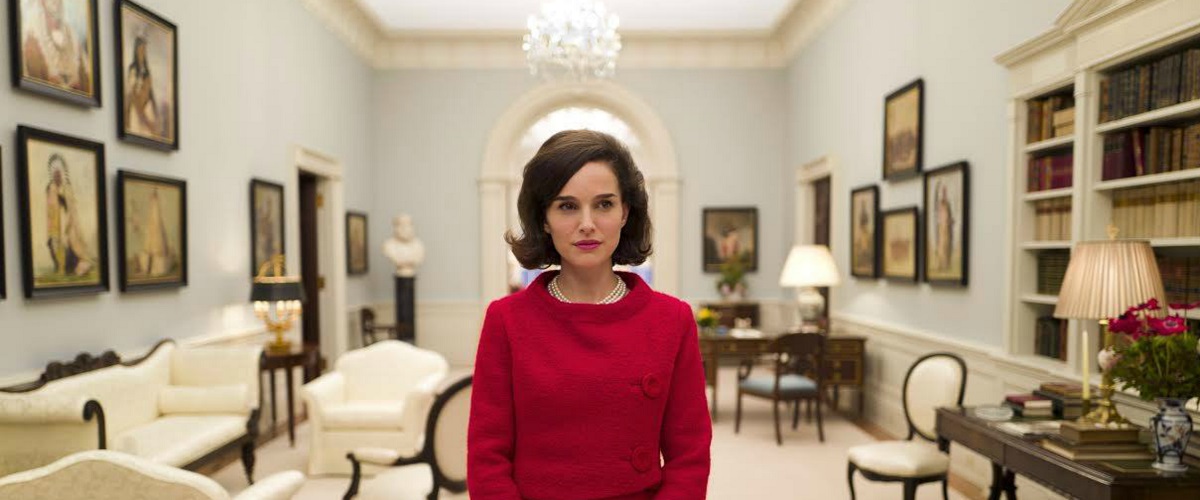It starts with an ominous drone, which begins to pulsate and wane, then silence suddenly, as picture and colors illuminate the screen. Directly from the start Pablo Larrain’s Jackie announces that it won’t be like countless other biopics and
the audience is all the better for it. That’s not to say that movie has any desire to fit that bill. This is something more. A mix of art house exploration, tone poem and the way history shapes us, this digs at the universal.
Unfolding over essentially 4 different time periods, including, but not limited to, the week directly after JFK’s assassination, Jackie
asks that it view the most famous 1st lady in history, both from extreme close up and at a great distance. What feels slightly alarming at first, has a purpose, as both edifice and artifice are to be examined, while simultaneously slowly being chipped away at.

At first the film feels as closed off as Jackie Kennedy herself (Natalie Portman, in a career best role), as she greets a Life magazine reporter (Billy Cruddup) at the Kennedy Compound in Kyannis Port. She asserts her will over the story, assuring the reporter that she will have full editorial control over the piece. He laughs for a moment before both realizing the seriousness of the situation. Often, over the course of events, he calls out possibly fallacies or ulterior motives that Mrs. Kennedy may have. Artfully she waves them away, like a sweeter, friendlier Cruella De Vil. She doesn’t mean any malice, but is acutely aware, that here, in this instance and the many that came before in that week, history was being shaped, with her hands on the clay.
Jackie isn’t alone in her struggle, flanked on both sides by Nancy Tuckerman (Greta Gerwig), a Social Secretary at the white house, and Bobby Kennedy (Peter Sarsgaard). While Nancy dutifully waits on and tries to console Jackie as best she can, Bobby is an unhinged rocket, trying to shield political talk away from the wounded wife, but lamenting what may have been. At one point he bemoans the fact that Lyndon B Johnson (John Carroll Lynch) has been handed a “slam dunk” in reference to Vietnam. Most of this, is white noise, meant to pepper bits of hysteria about. Everyone grieves in their own way, so a brother and widow should be no different. What we see here instead is how the mask slips, and what happens when people see the starkness on display.
Throughout the run time, events jump back to the famous 1962 televised tour of the White House. Jackie smiles, preens, poses and expounds upon the many changes she helped bring to the historic mansion during the administration. Larrain chooses deliberately to return to this spectacle, drawing direct correlation to Jackie’s state of mind. As calculating as her husband, but doubted at times due to her looks and station, we see someone who understood that every moment, every look, ever action was being etched in stone. One false move, you’re a footnote. One right move, you are immortal.

Collaboration between artists is tantamount on a project like this. Director, actress, designer and cinematographer must instinctively trust the other. Thankfully, in this instance, they all dance to the same beat. Portman gives a commanding performance, enveloping every scene and dominates the film as a whole. Every move, every glance, cry, doubt, shudder, trip, exhale, is given its pause. Her voice flirts with the right impression, yet a hint of exaggeration can be heard. At times it feels like Portman’s Jackie is right on the verge of camp. Like all things in the this feature though, it knows the tightrope is necessary and more so, the honest approach. It isn’t until she is alone in the residence section of the West Wing that we see Jackie covered in the carnage, her emotions and scars laid bare.
Few supporting parts get to shine throughout, but Richard E. Grant and John Hurt find a way to make an impression. Grant is more understated than he has been in a long time as Bill Walton, painter, as well as one of the Kennedy’s closest confidants. His elegant, intelligent voice of reason and steadfast loyalty to Jackie, helps bring a quiet dignity to somber affairs. Hurt plays a priest who engages in an elliptical tet-a-tet with Mrs. Kennedy before an important burial.
Often in film, music is the linchpin, that special ingredient that makes everything else swoon or fall into place. What Mica Levi produces though, is a revelation. A combination of a funeral procession and a death march, it builds in fits and spurts, matching every moment of the film, with the silence being all the more powerful.
If Jackie wishes to teach us anything, it’s that self preservation and moving out of the way of history can go hand in hand.
Raw, unflinching, unforgiving, obtuse, lyrical and maybe, just like life a tad embellished, but all the same, breathtakingly beautiful.



